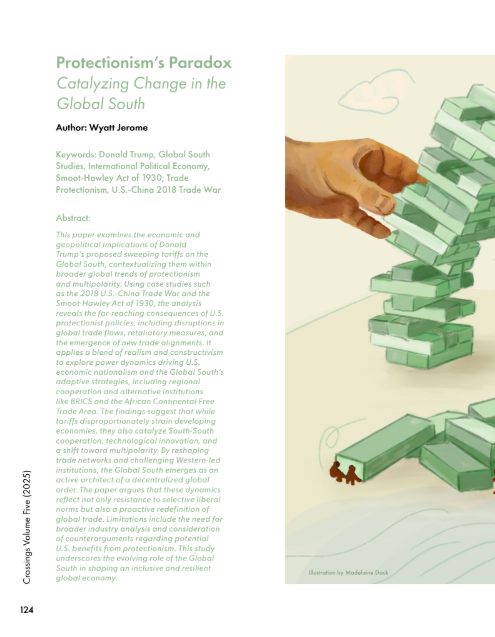Protectionism's Paradox
Catalyzing Change in the Global South
DOI:
https://doi.org/10.29173/crossings354Keywords:
Donald Trump, Global South Studies, International Political Economy, Smoot-Hawley Act of 1930, Trade Protectionism, U.S.-China 2018 Trade WarAbstract
This paper examines the economic and geopolitical implications of Donald Trump’s proposed sweeping tariffs on the Global South, contextualizing them within broader global trends of protectionism and multipolarity. Using case studies such as the 2018 U.S.-China Trade War and the Smoot-Hawley Act of 1930, the analysis reveals the far-reaching consequences of U.S. protectionist policies, including disruptions in global trade flows, retaliatory measures, and the emergence of new trade alignments. It applies a blend of realism and constructivism to explore power dynamics driving U.S. economic nationalism and the Global South’s adaptive strategies, including regional cooperation and alternative institutions like BRICS and the African Continental Free Trade Area. The findings suggest that while tariffs disproportionately strain developing economies, they also catalyze South-South cooperation, technological innovation, and a shift toward multipolarity. By reshaping trade networks and challenging Western-led institutions, the Global South emerges as an active architect of a decentralized global order. The paper argues that these dynamics reflect not only resistance to selective liberal norms but also a proactive redefinition of global trade. Limitations include the need for broader industry analysis and consideration of counterarguments regarding potential U.S. benefits from protectionism. This study underscores the evolving role of the Global South in shaping an increasingly multipolar international system.

Downloads
Published
Issue
Section
License
Copyright (c) 2025 Wyatt Jerome

This work is licensed under a Creative Commons Attribution 4.0 International License.

